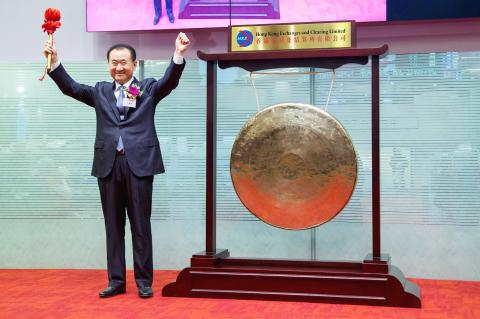Chinese shopping mall developer Dalian Wanda Commercial Properties (大連萬達商業地產) finished lower after its trading debut yesterday in Hong Kong, following an initial public offering (IPO) that broke records despite concerns about China’s cooling property market.
Shares in the Beijing-based company ended down at HK$46.75 by the close of trade, 2.6 percent lower than the HK$48 offering price, following the biggest IPO in the world by a real-estate firm which raised US$3.7 billion.
Analysts said the price drop was not surprising, given the stuttering performance of the property sector.

Photo: Reuters
“This is a property stock and the outlook for property in China is not good. Basically it is oversupplied,” Geo Securities (智易東方證券) CEO Francis Lun (藺常念) said.
The price drop “is not unexpected because the pricing is at the higher end of the range,” Lun said.
Owned by the property arm of Dalian Wanda Group and controlled by Chinese billionaire Wang Jianlin (王健林), the company is one of the world’s largest developers of shopping malls, owning dozens across China.
“Today is a historic day for Wanda and also an important milestone for the business development of Wanda,” Wang said, before striking the gong at the Hong Kong exchange to mark the listing.
Wang raised a glass of champagne with bourse officials and gave a double thumbs-up before trading began.
The listing comes after China cut interest rates last month to spur the mainland Chinese property market, which remains under pressure from a hefty inventory of unsold newly built homes.
House prices fell on a monthly basis for the seventh straight month last month, according to the independent China Index Academy.
Wanda slashed its IPO fundraising target by about a third from the original goal, possibly to attract investors concerned by the slowing real-estate market.
Analysts also pointed to the company’s high debt levels.
Wanda says it is the second-largest commercial property owner and operator in the world, with 175 property projects across China, including 71 Wanda Plazas, each made up of a combination of shopping centers, luxury hotels, and office and residential towers, according to the bourse filing.
Wang topped Forbes’ “China rich list” last year, with an estimated net worth of US$14.1 billion, but was displaced this year after Internet entrepreneur Jack Ma (馬雲) floated his e-commerce powerhouse Alibaba Group Holding Ltd (阿里巴巴) in the world’s biggest ever IPO. Ma’s fortune is now estimated at nearly US$20 billion.
Wang may find himself on top again after the Dalian Wanda listing.
“To be on the rich list is not my goal; my goal is to have my company become diversified and comprehensive,” Wang told reporters.
“When I was the richest man, I didn’t feel pain nor did I feel especially happy,” he said.
The Wanda Group bought US cinema chain AMC Entertainment Holdings two years ago and has also branched out into film production, theme parks, print media and art investment.

The Eurovision Song Contest has seen a surge in punter interest at the bookmakers, becoming a major betting event, experts said ahead of last night’s giant glamfest in Basel. “Eurovision has quietly become one of the biggest betting events of the year,” said Tomi Huttunen, senior manager of the Online Computer Finland (OCS) betting and casino platform. Betting sites have long been used to gauge which way voters might be leaning ahead of the world’s biggest televised live music event. However, bookmakers highlight a huge increase in engagement in recent years — and this year in particular. “We’ve already passed 2023’s total activity and

Nvidia Corp CEO Jensen Huang (黃仁勳) today announced that his company has selected "Beitou Shilin" in Taipei for its new Taiwan office, called Nvidia Constellation, putting an end to months of speculation. Industry sources have said that the tech giant has been eyeing the Beitou Shilin Science Park as the site of its new overseas headquarters, and speculated that the new headquarters would be built on two plots of land designated as "T17" and "T18," which span 3.89 hectares in the park. "I think it's time for us to reveal one of the largest products we've ever built," Huang said near the

China yesterday announced anti-dumping duties as high as 74.9 percent on imports of polyoxymethylene (POM) copolymers, a type of engineering plastic, from Taiwan, the US, the EU and Japan. The Chinese Ministry of Commerce’s findings conclude a probe launched in May last year, shortly after the US sharply increased tariffs on Chinese electric vehicles, computer chips and other imports. POM copolymers can partially replace metals such as copper and zinc, and have various applications, including in auto parts, electronics and medical equipment, the Chinese ministry has said. In January, it said initial investigations had determined that dumping was taking place, and implemented preliminary

Intel Corp yesterday reinforced its determination to strengthen its partnerships with Taiwan’s ecosystem partners including original-electronic-manufacturing (OEM) companies such as Hon Hai Precision Industry Co (鴻海精密) and chipmaker United Microelectronics Corp (UMC, 聯電). “Tonight marks a new beginning. We renew our new partnership with Taiwan ecosystem,” Intel new chief executive officer Tan Lip-bu (陳立武) said at a dinner with representatives from the company’s local partners, celebrating the 40th anniversary of the US chip giant’s presence in Taiwan. Tan took the reins at Intel six weeks ago aiming to reform the chipmaker and revive its past glory. This is the first time Tan